Entrepreneurship and Small Business Ventures: Analysis and Impact
VerifiedAdded on 2023/01/19
|19
|5951
|31
Report
AI Summary
This report provides a comprehensive analysis of entrepreneurial ventures, encompassing various types such as small business entrepreneurship, scalable start-up entrepreneurship, large business entrepreneurship, and social entrepreneurship. It explores the similarities and differences between these ventures, highlighting their objectives and characteristics. The report delves into the typologies of entrepreneurship, including lifestyle, male, and female entrepreneurship. Furthermore, it examines the impact of micro and small businesses on the UK economy, supported by statistical data and graphical representations illustrating their contribution to employment and economic growth. The report discusses the scope and developmental ventures faced by organizations, and emphasizes the crucial role of small and micro businesses in job creation and economic stimulation. The report also discusses the role of business ventures and their impact on the economy. In conclusion, the report provides a detailed overview of the entrepreneurial landscape, emphasizing the importance of small businesses and their impact on the economy.
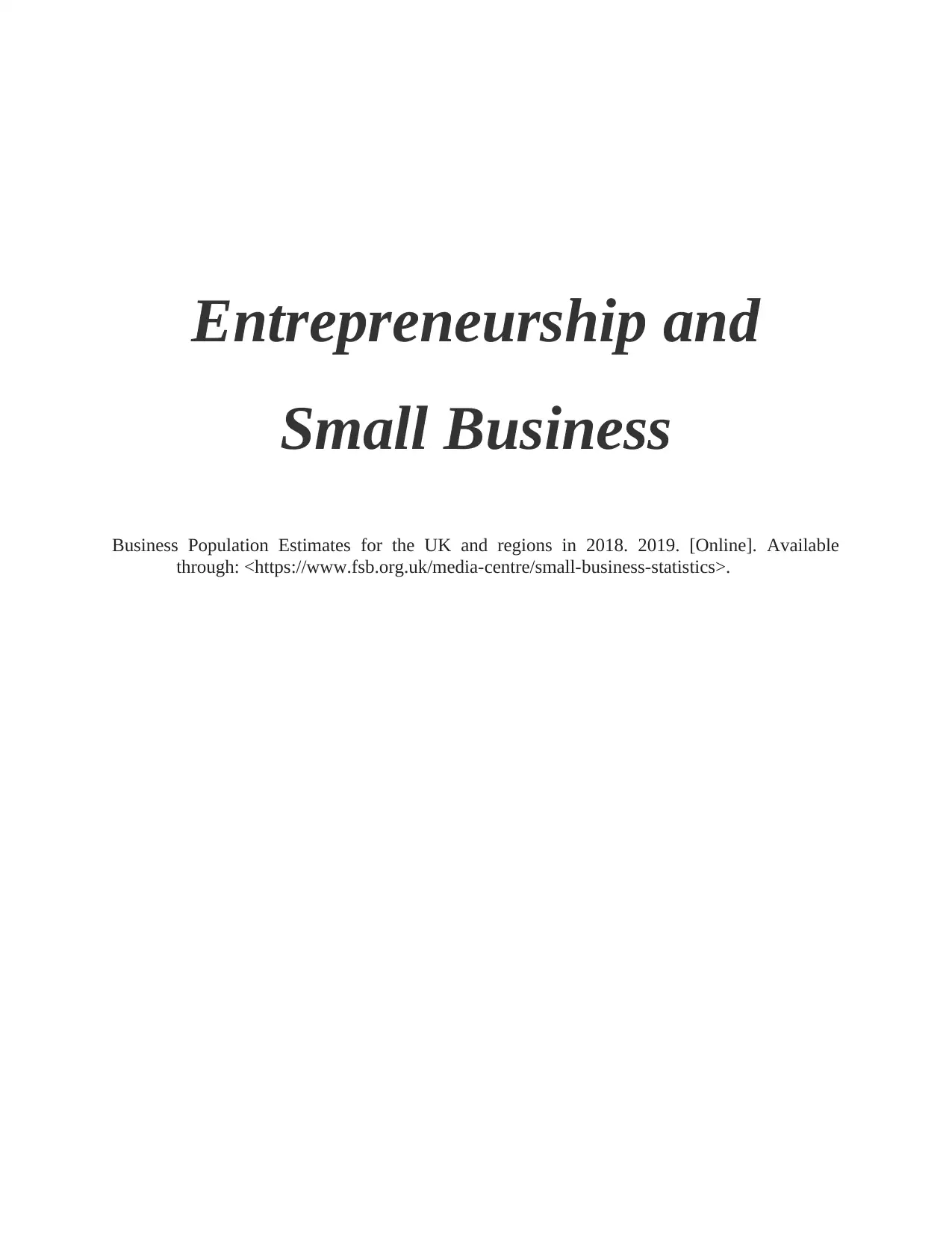
Entrepreneurship and
Small Business
Business Population Estimates for the UK and regions in 2018. 2019. [Online]. Available
through: <https://www.fsb.org.uk/media-centre/small-business-statistics>.
Small Business
Business Population Estimates for the UK and regions in 2018. 2019. [Online]. Available
through: <https://www.fsb.org.uk/media-centre/small-business-statistics>.
Paraphrase This Document
Need a fresh take? Get an instant paraphrase of this document with our AI Paraphraser

Table of Contents
INTRODUCTION...........................................................................................................................3
TASK 1............................................................................................................................................3
P1............................................................................................................................................3
P2............................................................................................................................................5
M1...........................................................................................................................................6
D1...........................................................................................................................................7
TASK 2............................................................................................................................................7
P3............................................................................................................................................7
M2...........................................................................................................................................9
P4............................................................................................................................................9
D2.........................................................................................................................................10
TASK 3..........................................................................................................................................11
P5..........................................................................................................................................11
P6..........................................................................................................................................13
M3.........................................................................................................................................14
D3.........................................................................................................................................14
TASK 4 .........................................................................................................................................15
P7..........................................................................................................................................15
M4.........................................................................................................................................16
D4.........................................................................................................................................16
CONCLUSION .............................................................................................................................16
REFERENCES..............................................................................................................................17
INTRODUCTION...........................................................................................................................3
TASK 1............................................................................................................................................3
P1............................................................................................................................................3
P2............................................................................................................................................5
M1...........................................................................................................................................6
D1...........................................................................................................................................7
TASK 2............................................................................................................................................7
P3............................................................................................................................................7
M2...........................................................................................................................................9
P4............................................................................................................................................9
D2.........................................................................................................................................10
TASK 3..........................................................................................................................................11
P5..........................................................................................................................................11
P6..........................................................................................................................................13
M3.........................................................................................................................................14
D3.........................................................................................................................................14
TASK 4 .........................................................................................................................................15
P7..........................................................................................................................................15
M4.........................................................................................................................................16
D4.........................................................................................................................................16
CONCLUSION .............................................................................................................................16
REFERENCES..............................................................................................................................17
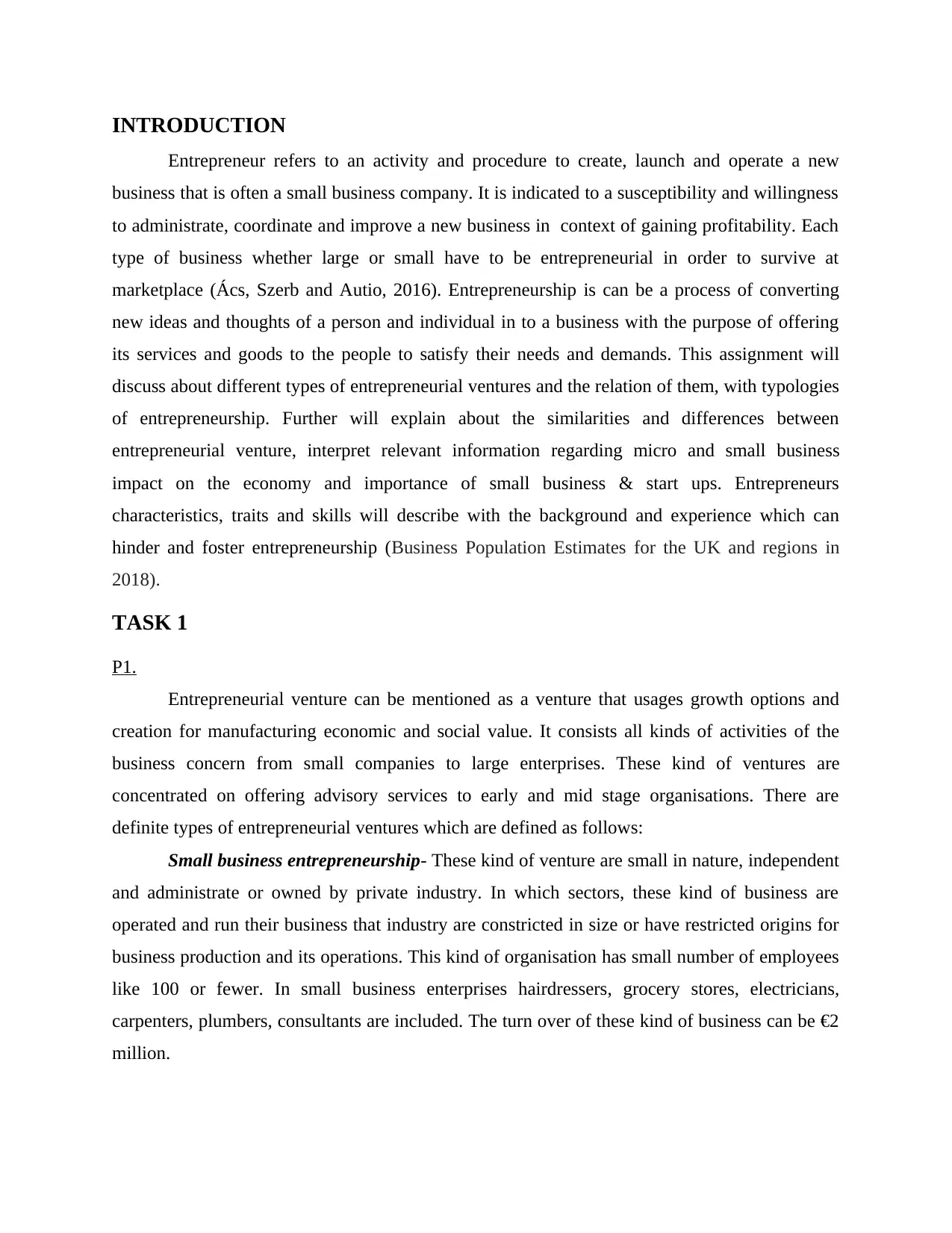
INTRODUCTION
Entrepreneur refers to an activity and procedure to create, launch and operate a new
business that is often a small business company. It is indicated to a susceptibility and willingness
to administrate, coordinate and improve a new business in context of gaining profitability. Each
type of business whether large or small have to be entrepreneurial in order to survive at
marketplace (Ács, Szerb and Autio, 2016). Entrepreneurship is can be a process of converting
new ideas and thoughts of a person and individual in to a business with the purpose of offering
its services and goods to the people to satisfy their needs and demands. This assignment will
discuss about different types of entrepreneurial ventures and the relation of them, with typologies
of entrepreneurship. Further will explain about the similarities and differences between
entrepreneurial venture, interpret relevant information regarding micro and small business
impact on the economy and importance of small business & start ups. Entrepreneurs
characteristics, traits and skills will describe with the background and experience which can
hinder and foster entrepreneurship (Business Population Estimates for the UK and regions in
2018).
TASK 1
P1.
Entrepreneurial venture can be mentioned as a venture that usages growth options and
creation for manufacturing economic and social value. It consists all kinds of activities of the
business concern from small companies to large enterprises. These kind of ventures are
concentrated on offering advisory services to early and mid stage organisations. There are
definite types of entrepreneurial ventures which are defined as follows:
Small business entrepreneurship- These kind of venture are small in nature, independent
and administrate or owned by private industry. In which sectors, these kind of business are
operated and run their business that industry are constricted in size or have restricted origins for
business production and its operations. This kind of organisation has small number of employees
like 100 or fewer. In small business enterprises hairdressers, grocery stores, electricians,
carpenters, plumbers, consultants are included. The turn over of these kind of business can be €2
million.
Entrepreneur refers to an activity and procedure to create, launch and operate a new
business that is often a small business company. It is indicated to a susceptibility and willingness
to administrate, coordinate and improve a new business in context of gaining profitability. Each
type of business whether large or small have to be entrepreneurial in order to survive at
marketplace (Ács, Szerb and Autio, 2016). Entrepreneurship is can be a process of converting
new ideas and thoughts of a person and individual in to a business with the purpose of offering
its services and goods to the people to satisfy their needs and demands. This assignment will
discuss about different types of entrepreneurial ventures and the relation of them, with typologies
of entrepreneurship. Further will explain about the similarities and differences between
entrepreneurial venture, interpret relevant information regarding micro and small business
impact on the economy and importance of small business & start ups. Entrepreneurs
characteristics, traits and skills will describe with the background and experience which can
hinder and foster entrepreneurship (Business Population Estimates for the UK and regions in
2018).
TASK 1
P1.
Entrepreneurial venture can be mentioned as a venture that usages growth options and
creation for manufacturing economic and social value. It consists all kinds of activities of the
business concern from small companies to large enterprises. These kind of ventures are
concentrated on offering advisory services to early and mid stage organisations. There are
definite types of entrepreneurial ventures which are defined as follows:
Small business entrepreneurship- These kind of venture are small in nature, independent
and administrate or owned by private industry. In which sectors, these kind of business are
operated and run their business that industry are constricted in size or have restricted origins for
business production and its operations. This kind of organisation has small number of employees
like 100 or fewer. In small business enterprises hairdressers, grocery stores, electricians,
carpenters, plumbers, consultants are included. The turn over of these kind of business can be €2
million.
⊘ This is a preview!⊘
Do you want full access?
Subscribe today to unlock all pages.

Trusted by 1+ million students worldwide
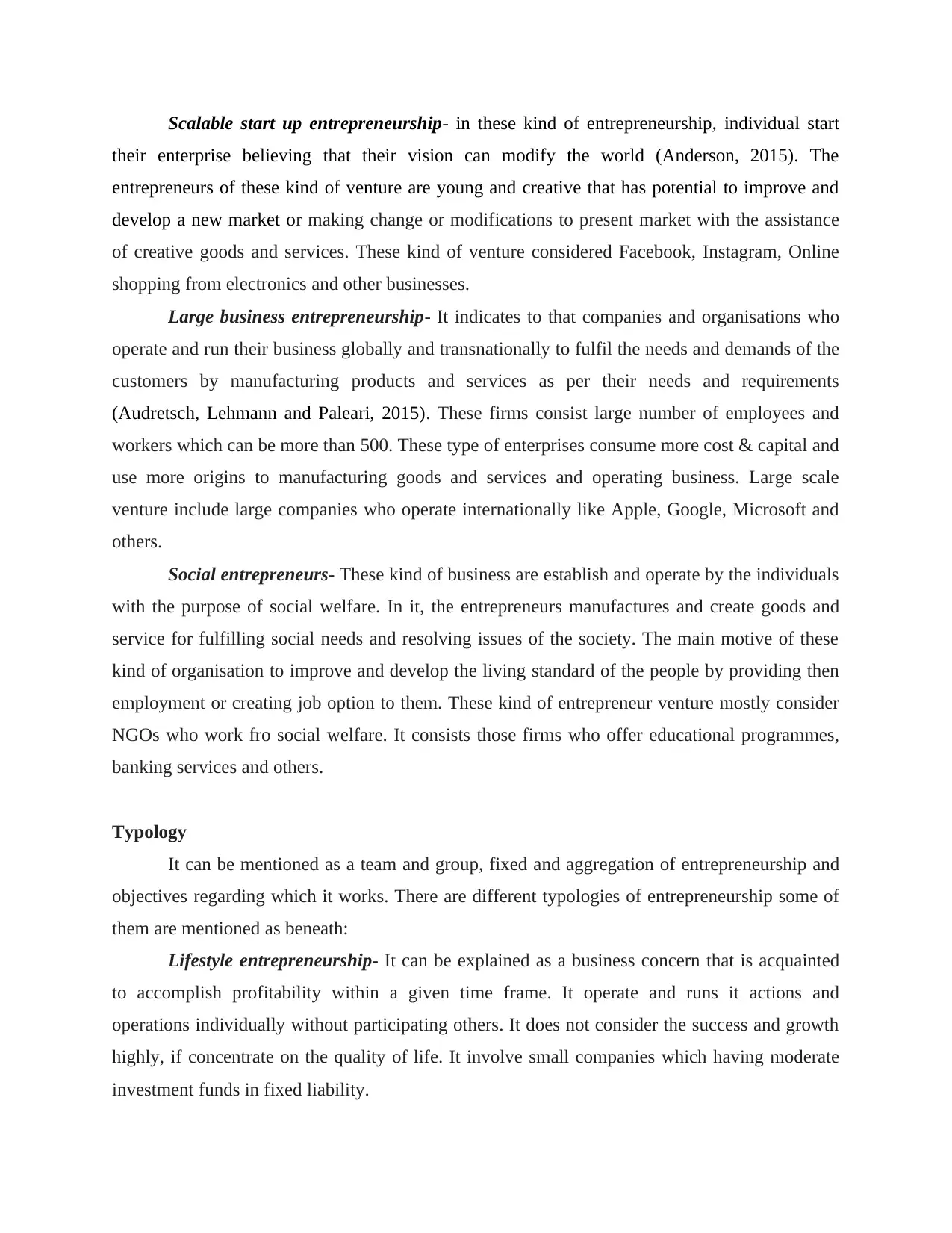
Scalable start up entrepreneurship- in these kind of entrepreneurship, individual start
their enterprise believing that their vision can modify the world (Anderson, 2015). The
entrepreneurs of these kind of venture are young and creative that has potential to improve and
develop a new market or making change or modifications to present market with the assistance
of creative goods and services. These kind of venture considered Facebook, Instagram, Online
shopping from electronics and other businesses.
Large business entrepreneurship- It indicates to that companies and organisations who
operate and run their business globally and transnationally to fulfil the needs and demands of the
customers by manufacturing products and services as per their needs and requirements
(Audretsch, Lehmann and Paleari, 2015). These firms consist large number of employees and
workers which can be more than 500. These type of enterprises consume more cost & capital and
use more origins to manufacturing goods and services and operating business. Large scale
venture include large companies who operate internationally like Apple, Google, Microsoft and
others.
Social entrepreneurs- These kind of business are establish and operate by the individuals
with the purpose of social welfare. In it, the entrepreneurs manufactures and create goods and
service for fulfilling social needs and resolving issues of the society. The main motive of these
kind of organisation to improve and develop the living standard of the people by providing then
employment or creating job option to them. These kind of entrepreneur venture mostly consider
NGOs who work fro social welfare. It consists those firms who offer educational programmes,
banking services and others.
Typology
It can be mentioned as a team and group, fixed and aggregation of entrepreneurship and
objectives regarding which it works. There are different typologies of entrepreneurship some of
them are mentioned as beneath:
Lifestyle entrepreneurship- It can be explained as a business concern that is acquainted
to accomplish profitability within a given time frame. It operate and runs it actions and
operations individually without participating others. It does not consider the success and growth
highly, if concentrate on the quality of life. It involve small companies which having moderate
investment funds in fixed liability.
their enterprise believing that their vision can modify the world (Anderson, 2015). The
entrepreneurs of these kind of venture are young and creative that has potential to improve and
develop a new market or making change or modifications to present market with the assistance
of creative goods and services. These kind of venture considered Facebook, Instagram, Online
shopping from electronics and other businesses.
Large business entrepreneurship- It indicates to that companies and organisations who
operate and run their business globally and transnationally to fulfil the needs and demands of the
customers by manufacturing products and services as per their needs and requirements
(Audretsch, Lehmann and Paleari, 2015). These firms consist large number of employees and
workers which can be more than 500. These type of enterprises consume more cost & capital and
use more origins to manufacturing goods and services and operating business. Large scale
venture include large companies who operate internationally like Apple, Google, Microsoft and
others.
Social entrepreneurs- These kind of business are establish and operate by the individuals
with the purpose of social welfare. In it, the entrepreneurs manufactures and create goods and
service for fulfilling social needs and resolving issues of the society. The main motive of these
kind of organisation to improve and develop the living standard of the people by providing then
employment or creating job option to them. These kind of entrepreneur venture mostly consider
NGOs who work fro social welfare. It consists those firms who offer educational programmes,
banking services and others.
Typology
It can be mentioned as a team and group, fixed and aggregation of entrepreneurship and
objectives regarding which it works. There are different typologies of entrepreneurship some of
them are mentioned as beneath:
Lifestyle entrepreneurship- It can be explained as a business concern that is acquainted
to accomplish profitability within a given time frame. It operate and runs it actions and
operations individually without participating others. It does not consider the success and growth
highly, if concentrate on the quality of life. It involve small companies which having moderate
investment funds in fixed liability.
Paraphrase This Document
Need a fresh take? Get an instant paraphrase of this document with our AI Paraphraser
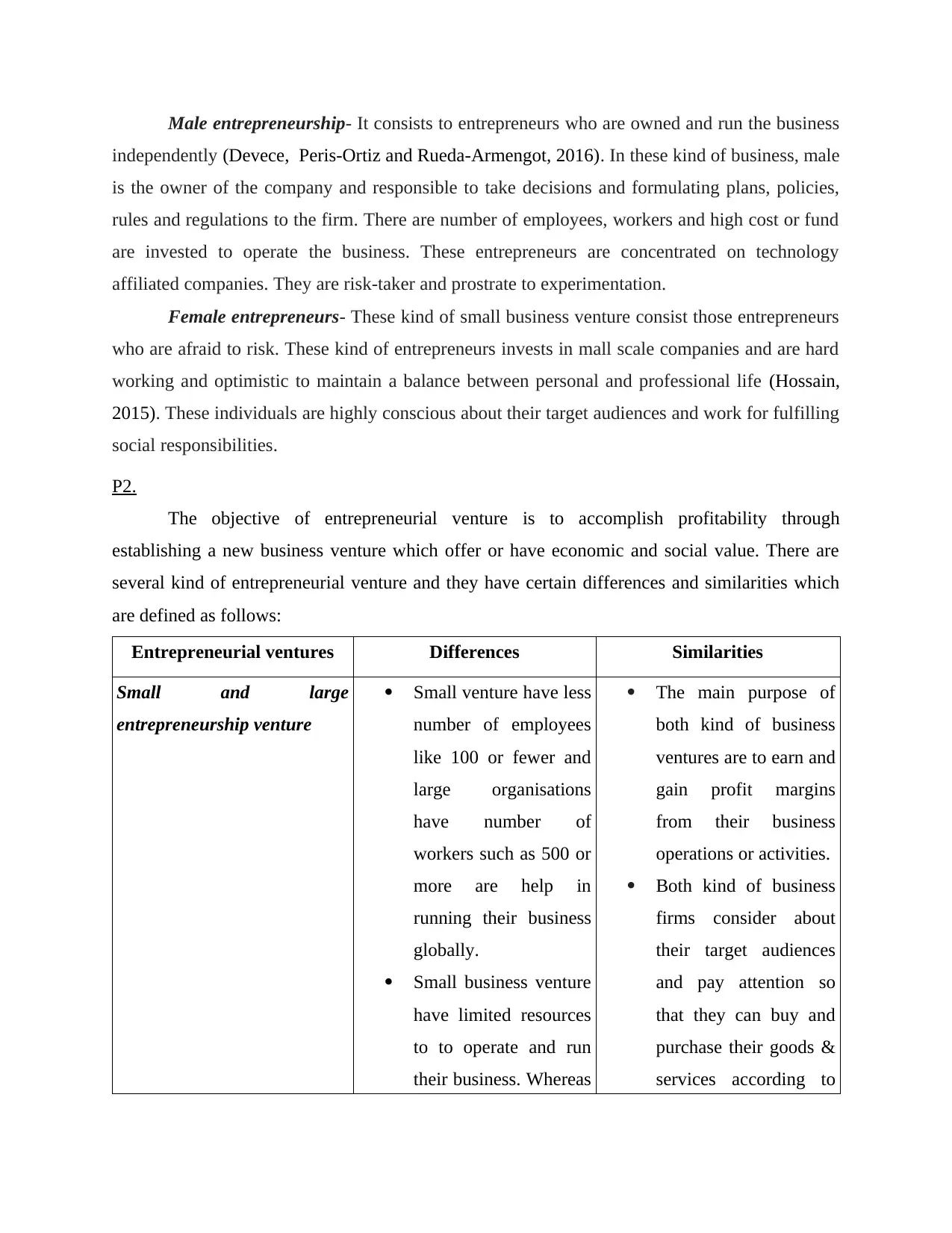
Male entrepreneurship- It consists to entrepreneurs who are owned and run the business
independently (Devece, Peris-Ortiz and Rueda-Armengot, 2016). In these kind of business, male
is the owner of the company and responsible to take decisions and formulating plans, policies,
rules and regulations to the firm. There are number of employees, workers and high cost or fund
are invested to operate the business. These entrepreneurs are concentrated on technology
affiliated companies. They are risk-taker and prostrate to experimentation.
Female entrepreneurs- These kind of small business venture consist those entrepreneurs
who are afraid to risk. These kind of entrepreneurs invests in mall scale companies and are hard
working and optimistic to maintain a balance between personal and professional life (Hossain,
2015). These individuals are highly conscious about their target audiences and work for fulfilling
social responsibilities.
P2.
The objective of entrepreneurial venture is to accomplish profitability through
establishing a new business venture which offer or have economic and social value. There are
several kind of entrepreneurial venture and they have certain differences and similarities which
are defined as follows:
Entrepreneurial ventures Differences Similarities
Small and large
entrepreneurship venture
Small venture have less
number of employees
like 100 or fewer and
large organisations
have number of
workers such as 500 or
more are help in
running their business
globally.
Small business venture
have limited resources
to to operate and run
their business. Whereas
The main purpose of
both kind of business
ventures are to earn and
gain profit margins
from their business
operations or activities.
Both kind of business
firms consider about
their target audiences
and pay attention so
that they can buy and
purchase their goods &
services according to
independently (Devece, Peris-Ortiz and Rueda-Armengot, 2016). In these kind of business, male
is the owner of the company and responsible to take decisions and formulating plans, policies,
rules and regulations to the firm. There are number of employees, workers and high cost or fund
are invested to operate the business. These entrepreneurs are concentrated on technology
affiliated companies. They are risk-taker and prostrate to experimentation.
Female entrepreneurs- These kind of small business venture consist those entrepreneurs
who are afraid to risk. These kind of entrepreneurs invests in mall scale companies and are hard
working and optimistic to maintain a balance between personal and professional life (Hossain,
2015). These individuals are highly conscious about their target audiences and work for fulfilling
social responsibilities.
P2.
The objective of entrepreneurial venture is to accomplish profitability through
establishing a new business venture which offer or have economic and social value. There are
several kind of entrepreneurial venture and they have certain differences and similarities which
are defined as follows:
Entrepreneurial ventures Differences Similarities
Small and large
entrepreneurship venture
Small venture have less
number of employees
like 100 or fewer and
large organisations
have number of
workers such as 500 or
more are help in
running their business
globally.
Small business venture
have limited resources
to to operate and run
their business. Whereas
The main purpose of
both kind of business
ventures are to earn and
gain profit margins
from their business
operations or activities.
Both kind of business
firms consider about
their target audiences
and pay attention so
that they can buy and
purchase their goods &
services according to
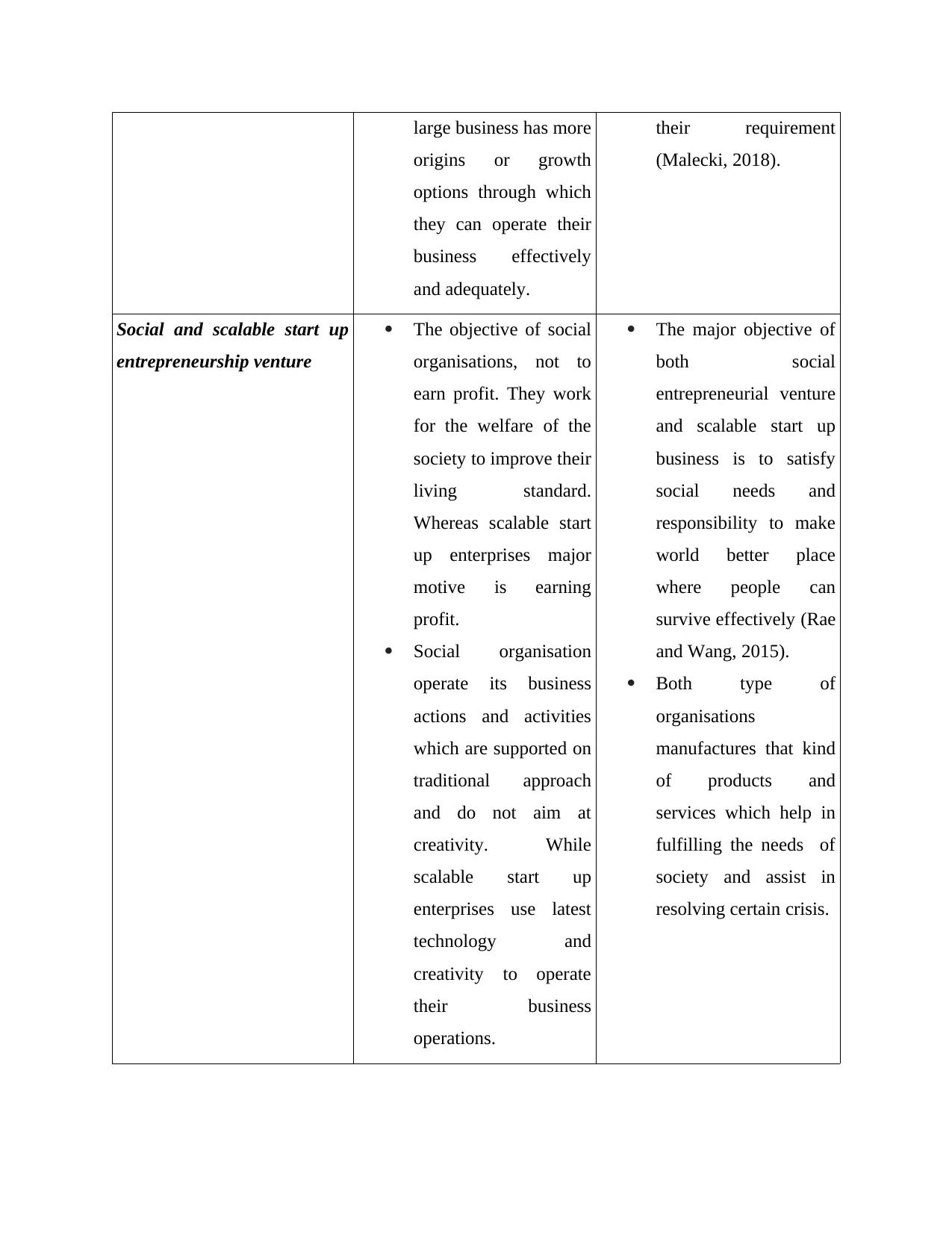
large business has more
origins or growth
options through which
they can operate their
business effectively
and adequately.
their requirement
(Malecki, 2018).
Social and scalable start up
entrepreneurship venture
The objective of social
organisations, not to
earn profit. They work
for the welfare of the
society to improve their
living standard.
Whereas scalable start
up enterprises major
motive is earning
profit.
Social organisation
operate its business
actions and activities
which are supported on
traditional approach
and do not aim at
creativity. While
scalable start up
enterprises use latest
technology and
creativity to operate
their business
operations.
The major objective of
both social
entrepreneurial venture
and scalable start up
business is to satisfy
social needs and
responsibility to make
world better place
where people can
survive effectively (Rae
and Wang, 2015).
Both type of
organisations
manufactures that kind
of products and
services which help in
fulfilling the needs of
society and assist in
resolving certain crisis.
origins or growth
options through which
they can operate their
business effectively
and adequately.
their requirement
(Malecki, 2018).
Social and scalable start up
entrepreneurship venture
The objective of social
organisations, not to
earn profit. They work
for the welfare of the
society to improve their
living standard.
Whereas scalable start
up enterprises major
motive is earning
profit.
Social organisation
operate its business
actions and activities
which are supported on
traditional approach
and do not aim at
creativity. While
scalable start up
enterprises use latest
technology and
creativity to operate
their business
operations.
The major objective of
both social
entrepreneurial venture
and scalable start up
business is to satisfy
social needs and
responsibility to make
world better place
where people can
survive effectively (Rae
and Wang, 2015).
Both type of
organisations
manufactures that kind
of products and
services which help in
fulfilling the needs of
society and assist in
resolving certain crisis.
⊘ This is a preview!⊘
Do you want full access?
Subscribe today to unlock all pages.

Trusted by 1+ million students worldwide
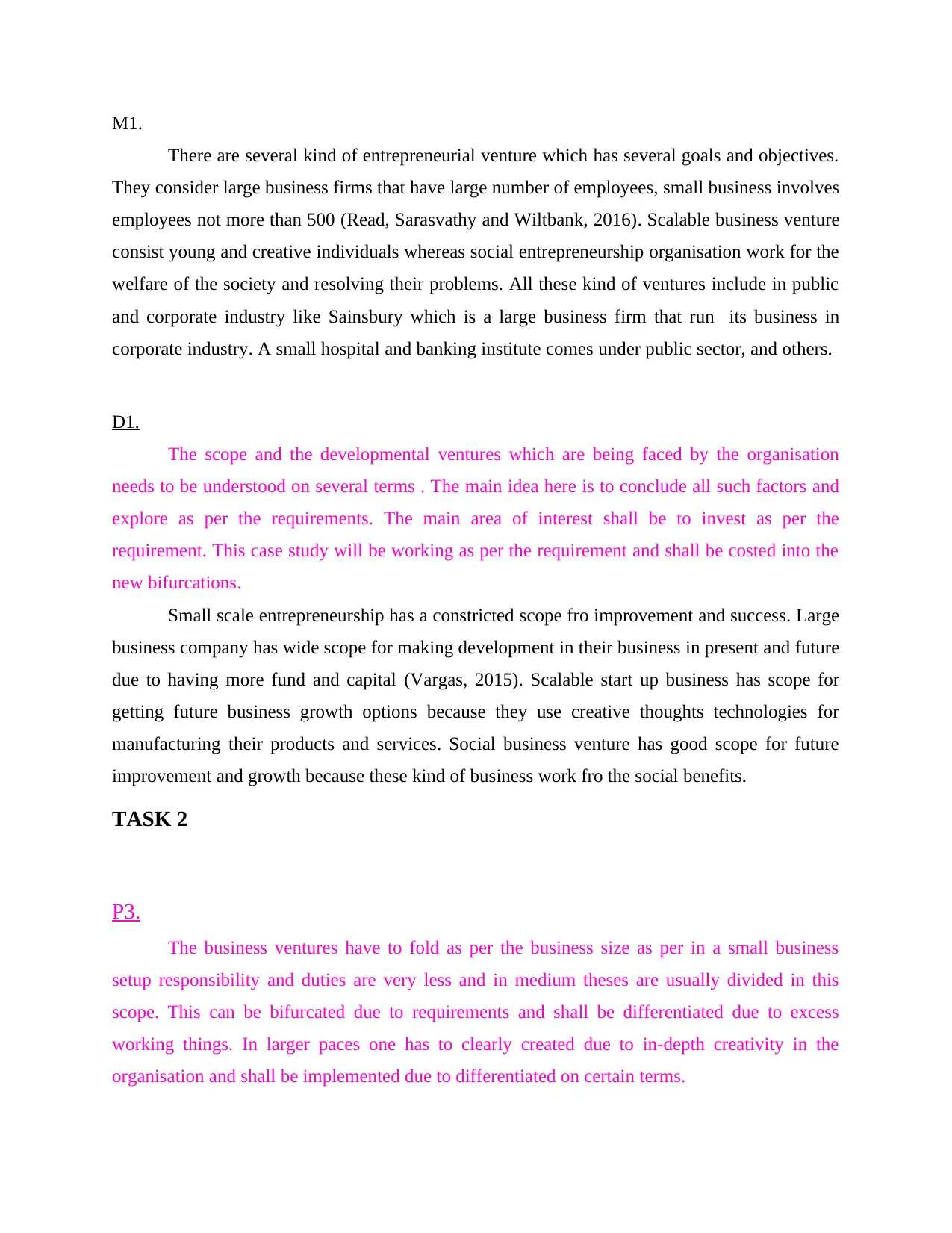
M1.
There are several kind of entrepreneurial venture which has several goals and objectives.
They consider large business firms that have large number of employees, small business involves
employees not more than 500 (Read, Sarasvathy and Wiltbank, 2016). Scalable business venture
consist young and creative individuals whereas social entrepreneurship organisation work for the
welfare of the society and resolving their problems. All these kind of ventures include in public
and corporate industry like Sainsbury which is a large business firm that run its business in
corporate industry. A small hospital and banking institute comes under public sector, and others.
D1.
The scope and the developmental ventures which are being faced by the organisation
needs to be understood on several terms . The main idea here is to conclude all such factors and
explore as per the requirements. The main area of interest shall be to invest as per the
requirement. This case study will be working as per the requirement and shall be costed into the
new bifurcations.
Small scale entrepreneurship has a constricted scope fro improvement and success. Large
business company has wide scope for making development in their business in present and future
due to having more fund and capital (Vargas, 2015). Scalable start up business has scope for
getting future business growth options because they use creative thoughts technologies for
manufacturing their products and services. Social business venture has good scope for future
improvement and growth because these kind of business work fro the social benefits.
TASK 2
P3.
The business ventures have to fold as per the business size as per in a small business
setup responsibility and duties are very less and in medium theses are usually divided in this
scope. This can be bifurcated due to requirements and shall be differentiated due to excess
working things. In larger paces one has to clearly created due to in-depth creativity in the
organisation and shall be implemented due to differentiated on certain terms.
There are several kind of entrepreneurial venture which has several goals and objectives.
They consider large business firms that have large number of employees, small business involves
employees not more than 500 (Read, Sarasvathy and Wiltbank, 2016). Scalable business venture
consist young and creative individuals whereas social entrepreneurship organisation work for the
welfare of the society and resolving their problems. All these kind of ventures include in public
and corporate industry like Sainsbury which is a large business firm that run its business in
corporate industry. A small hospital and banking institute comes under public sector, and others.
D1.
The scope and the developmental ventures which are being faced by the organisation
needs to be understood on several terms . The main idea here is to conclude all such factors and
explore as per the requirements. The main area of interest shall be to invest as per the
requirement. This case study will be working as per the requirement and shall be costed into the
new bifurcations.
Small scale entrepreneurship has a constricted scope fro improvement and success. Large
business company has wide scope for making development in their business in present and future
due to having more fund and capital (Vargas, 2015). Scalable start up business has scope for
getting future business growth options because they use creative thoughts technologies for
manufacturing their products and services. Social business venture has good scope for future
improvement and growth because these kind of business work fro the social benefits.
TASK 2
P3.
The business ventures have to fold as per the business size as per in a small business
setup responsibility and duties are very less and in medium theses are usually divided in this
scope. This can be bifurcated due to requirements and shall be differentiated due to excess
working things. In larger paces one has to clearly created due to in-depth creativity in the
organisation and shall be implemented due to differentiated on certain terms.
Paraphrase This Document
Need a fresh take? Get an instant paraphrase of this document with our AI Paraphraser
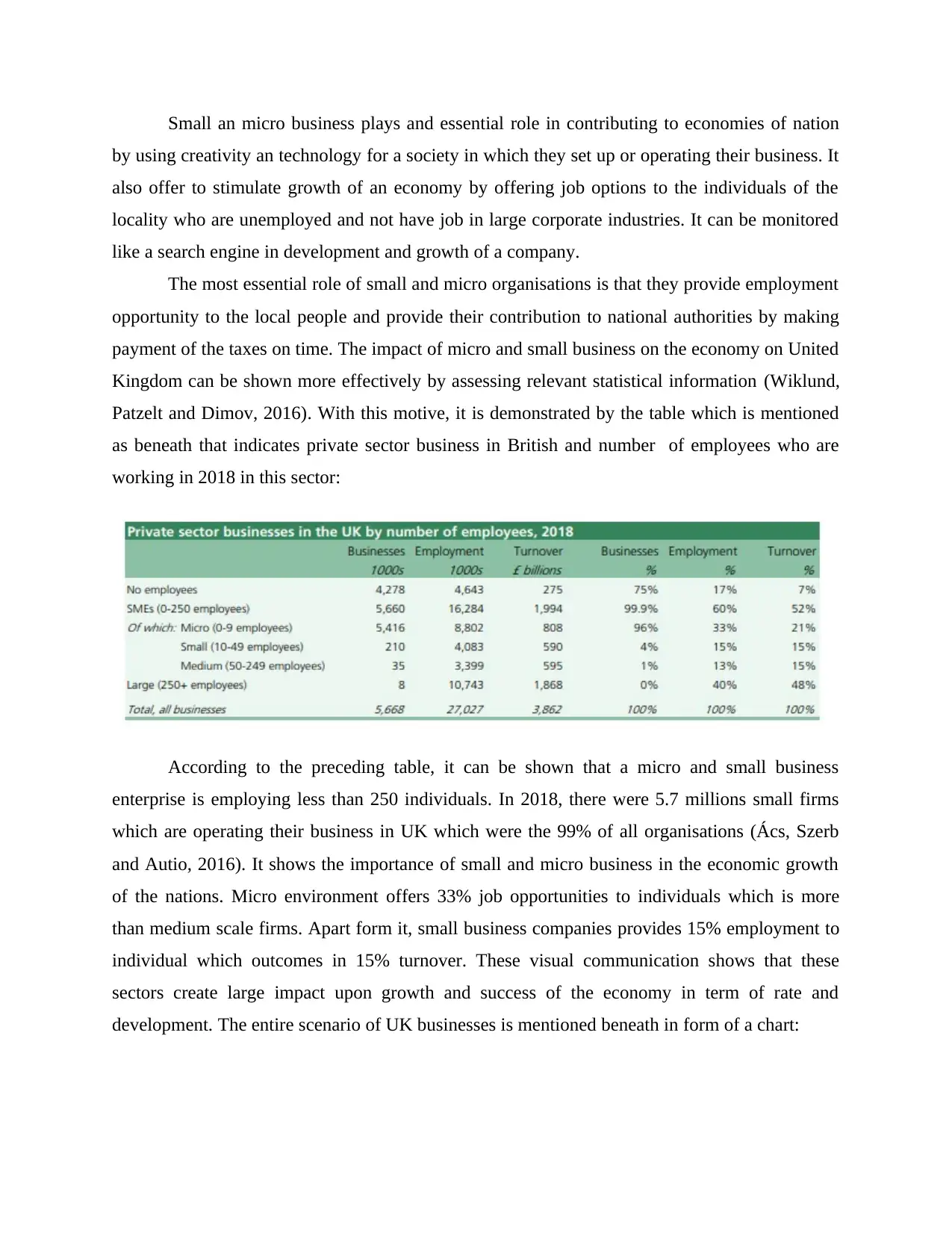
Small an micro business plays and essential role in contributing to economies of nation
by using creativity an technology for a society in which they set up or operating their business. It
also offer to stimulate growth of an economy by offering job options to the individuals of the
locality who are unemployed and not have job in large corporate industries. It can be monitored
like a search engine in development and growth of a company.
The most essential role of small and micro organisations is that they provide employment
opportunity to the local people and provide their contribution to national authorities by making
payment of the taxes on time. The impact of micro and small business on the economy on United
Kingdom can be shown more effectively by assessing relevant statistical information (Wiklund,
Patzelt and Dimov, 2016). With this motive, it is demonstrated by the table which is mentioned
as beneath that indicates private sector business in British and number of employees who are
working in 2018 in this sector:
According to the preceding table, it can be shown that a micro and small business
enterprise is employing less than 250 individuals. In 2018, there were 5.7 millions small firms
which are operating their business in UK which were the 99% of all organisations (Ács, Szerb
and Autio, 2016). It shows the importance of small and micro business in the economic growth
of the nations. Micro environment offers 33% job opportunities to individuals which is more
than medium scale firms. Apart form it, small business companies provides 15% employment to
individual which outcomes in 15% turnover. These visual communication shows that these
sectors create large impact upon growth and success of the economy in term of rate and
development. The entire scenario of UK businesses is mentioned beneath in form of a chart:
by using creativity an technology for a society in which they set up or operating their business. It
also offer to stimulate growth of an economy by offering job options to the individuals of the
locality who are unemployed and not have job in large corporate industries. It can be monitored
like a search engine in development and growth of a company.
The most essential role of small and micro organisations is that they provide employment
opportunity to the local people and provide their contribution to national authorities by making
payment of the taxes on time. The impact of micro and small business on the economy on United
Kingdom can be shown more effectively by assessing relevant statistical information (Wiklund,
Patzelt and Dimov, 2016). With this motive, it is demonstrated by the table which is mentioned
as beneath that indicates private sector business in British and number of employees who are
working in 2018 in this sector:
According to the preceding table, it can be shown that a micro and small business
enterprise is employing less than 250 individuals. In 2018, there were 5.7 millions small firms
which are operating their business in UK which were the 99% of all organisations (Ács, Szerb
and Autio, 2016). It shows the importance of small and micro business in the economic growth
of the nations. Micro environment offers 33% job opportunities to individuals which is more
than medium scale firms. Apart form it, small business companies provides 15% employment to
individual which outcomes in 15% turnover. These visual communication shows that these
sectors create large impact upon growth and success of the economy in term of rate and
development. The entire scenario of UK businesses is mentioned beneath in form of a chart:
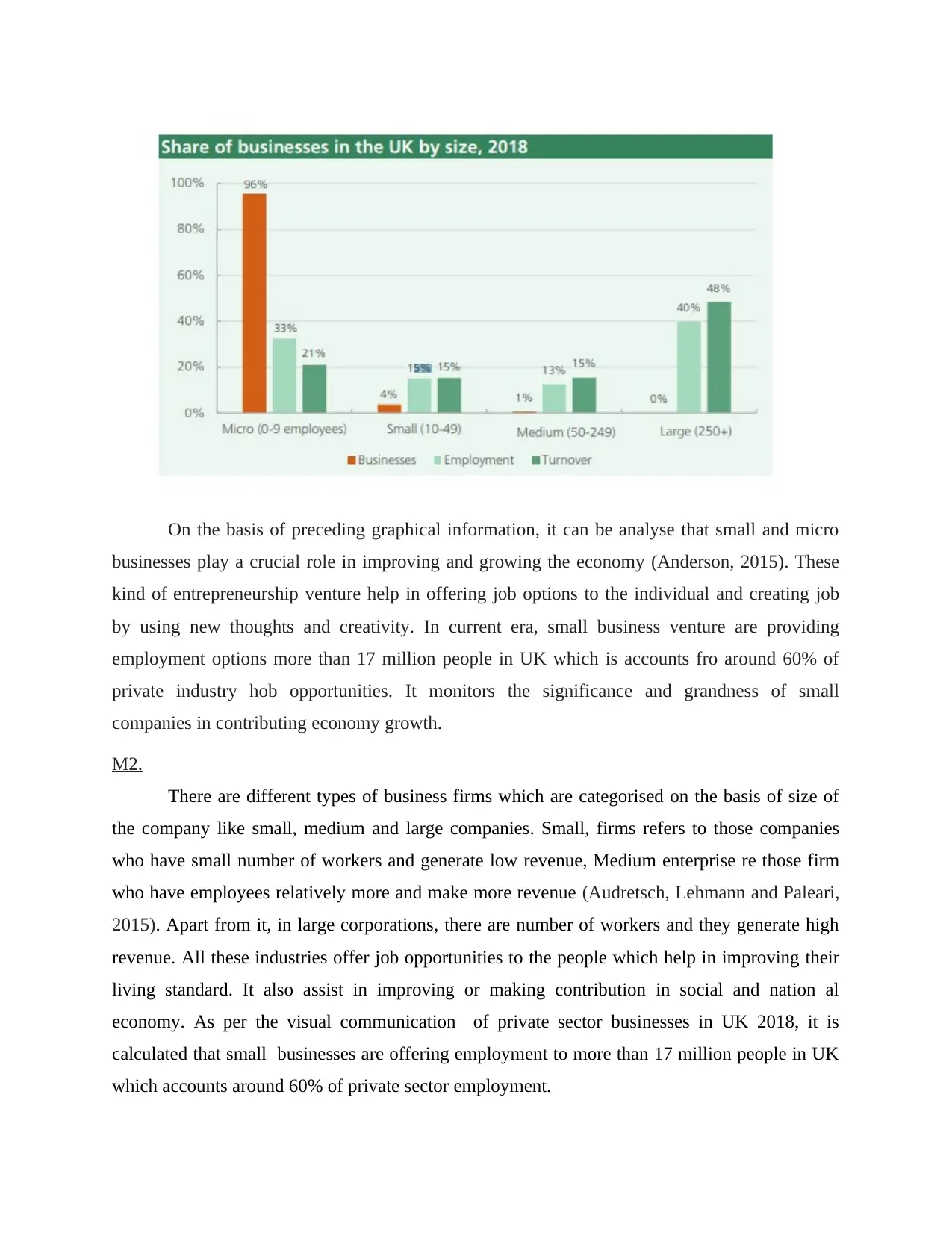
On the basis of preceding graphical information, it can be analyse that small and micro
businesses play a crucial role in improving and growing the economy (Anderson, 2015). These
kind of entrepreneurship venture help in offering job options to the individual and creating job
by using new thoughts and creativity. In current era, small business venture are providing
employment options more than 17 million people in UK which is accounts fro around 60% of
private industry hob opportunities. It monitors the significance and grandness of small
companies in contributing economy growth.
M2.
There are different types of business firms which are categorised on the basis of size of
the company like small, medium and large companies. Small, firms refers to those companies
who have small number of workers and generate low revenue, Medium enterprise re those firm
who have employees relatively more and make more revenue (Audretsch, Lehmann and Paleari,
2015). Apart from it, in large corporations, there are number of workers and they generate high
revenue. All these industries offer job opportunities to the people which help in improving their
living standard. It also assist in improving or making contribution in social and nation al
economy. As per the visual communication of private sector businesses in UK 2018, it is
calculated that small businesses are offering employment to more than 17 million people in UK
which accounts around 60% of private sector employment.
businesses play a crucial role in improving and growing the economy (Anderson, 2015). These
kind of entrepreneurship venture help in offering job options to the individual and creating job
by using new thoughts and creativity. In current era, small business venture are providing
employment options more than 17 million people in UK which is accounts fro around 60% of
private industry hob opportunities. It monitors the significance and grandness of small
companies in contributing economy growth.
M2.
There are different types of business firms which are categorised on the basis of size of
the company like small, medium and large companies. Small, firms refers to those companies
who have small number of workers and generate low revenue, Medium enterprise re those firm
who have employees relatively more and make more revenue (Audretsch, Lehmann and Paleari,
2015). Apart from it, in large corporations, there are number of workers and they generate high
revenue. All these industries offer job opportunities to the people which help in improving their
living standard. It also assist in improving or making contribution in social and nation al
economy. As per the visual communication of private sector businesses in UK 2018, it is
calculated that small businesses are offering employment to more than 17 million people in UK
which accounts around 60% of private sector employment.
⊘ This is a preview!⊘
Do you want full access?
Subscribe today to unlock all pages.

Trusted by 1+ million students worldwide
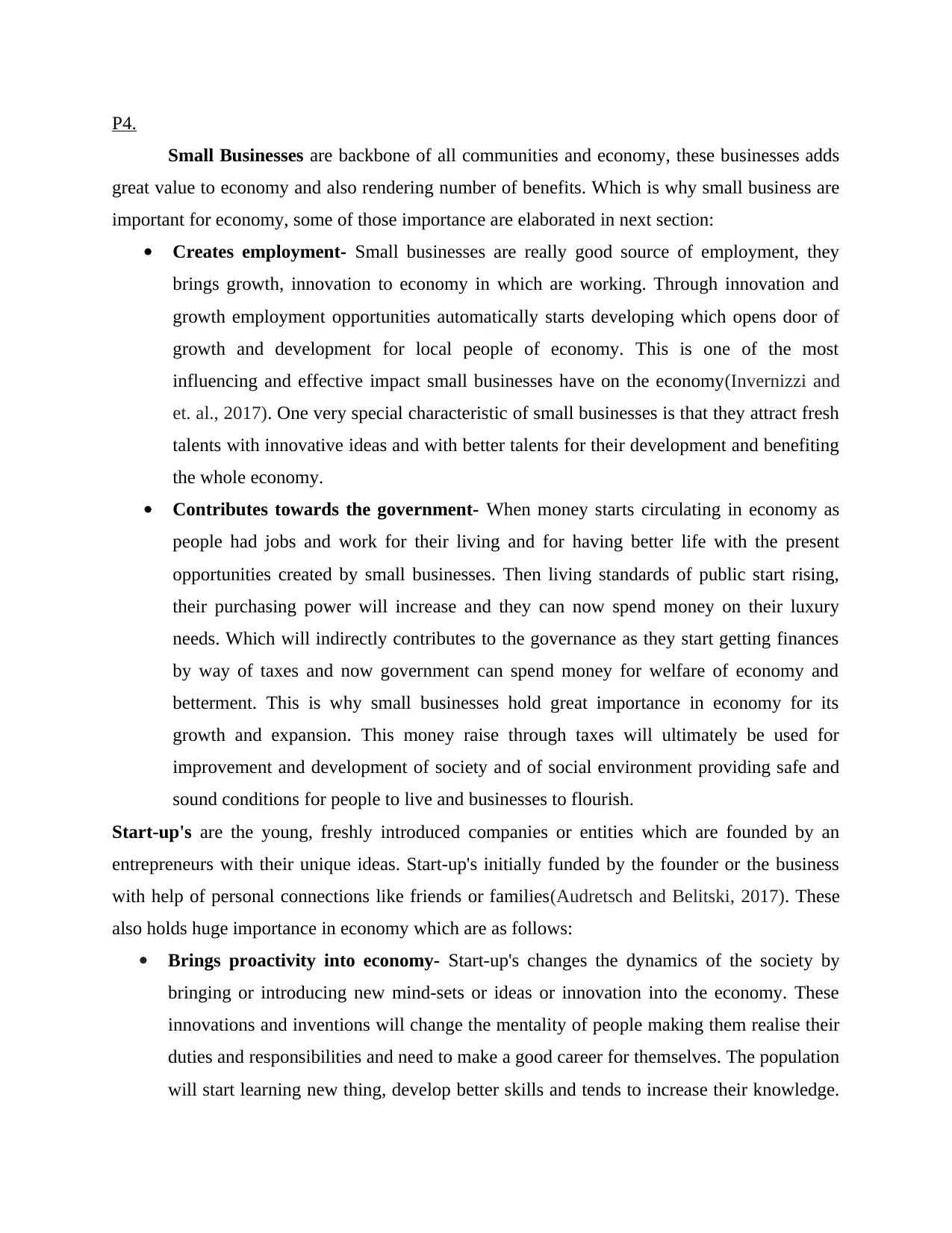
P4.
Small Businesses are backbone of all communities and economy, these businesses adds
great value to economy and also rendering number of benefits. Which is why small business are
important for economy, some of those importance are elaborated in next section:
Creates employment- Small businesses are really good source of employment, they
brings growth, innovation to economy in which are working. Through innovation and
growth employment opportunities automatically starts developing which opens door of
growth and development for local people of economy. This is one of the most
influencing and effective impact small businesses have on the economy(Invernizzi and
et. al., 2017). One very special characteristic of small businesses is that they attract fresh
talents with innovative ideas and with better talents for their development and benefiting
the whole economy.
Contributes towards the government- When money starts circulating in economy as
people had jobs and work for their living and for having better life with the present
opportunities created by small businesses. Then living standards of public start rising,
their purchasing power will increase and they can now spend money on their luxury
needs. Which will indirectly contributes to the governance as they start getting finances
by way of taxes and now government can spend money for welfare of economy and
betterment. This is why small businesses hold great importance in economy for its
growth and expansion. This money raise through taxes will ultimately be used for
improvement and development of society and of social environment providing safe and
sound conditions for people to live and businesses to flourish.
Start-up's are the young, freshly introduced companies or entities which are founded by an
entrepreneurs with their unique ideas. Start-up's initially funded by the founder or the business
with help of personal connections like friends or families(Audretsch and Belitski, 2017). These
also holds huge importance in economy which are as follows:
Brings proactivity into economy- Start-up's changes the dynamics of the society by
bringing or introducing new mind-sets or ideas or innovation into the economy. These
innovations and inventions will change the mentality of people making them realise their
duties and responsibilities and need to make a good career for themselves. The population
will start learning new thing, develop better skills and tends to increase their knowledge.
Small Businesses are backbone of all communities and economy, these businesses adds
great value to economy and also rendering number of benefits. Which is why small business are
important for economy, some of those importance are elaborated in next section:
Creates employment- Small businesses are really good source of employment, they
brings growth, innovation to economy in which are working. Through innovation and
growth employment opportunities automatically starts developing which opens door of
growth and development for local people of economy. This is one of the most
influencing and effective impact small businesses have on the economy(Invernizzi and
et. al., 2017). One very special characteristic of small businesses is that they attract fresh
talents with innovative ideas and with better talents for their development and benefiting
the whole economy.
Contributes towards the government- When money starts circulating in economy as
people had jobs and work for their living and for having better life with the present
opportunities created by small businesses. Then living standards of public start rising,
their purchasing power will increase and they can now spend money on their luxury
needs. Which will indirectly contributes to the governance as they start getting finances
by way of taxes and now government can spend money for welfare of economy and
betterment. This is why small businesses hold great importance in economy for its
growth and expansion. This money raise through taxes will ultimately be used for
improvement and development of society and of social environment providing safe and
sound conditions for people to live and businesses to flourish.
Start-up's are the young, freshly introduced companies or entities which are founded by an
entrepreneurs with their unique ideas. Start-up's initially funded by the founder or the business
with help of personal connections like friends or families(Audretsch and Belitski, 2017). These
also holds huge importance in economy which are as follows:
Brings proactivity into economy- Start-up's changes the dynamics of the society by
bringing or introducing new mind-sets or ideas or innovation into the economy. These
innovations and inventions will change the mentality of people making them realise their
duties and responsibilities and need to make a good career for themselves. The population
will start learning new thing, develop better skills and tends to increase their knowledge.
Paraphrase This Document
Need a fresh take? Get an instant paraphrase of this document with our AI Paraphraser
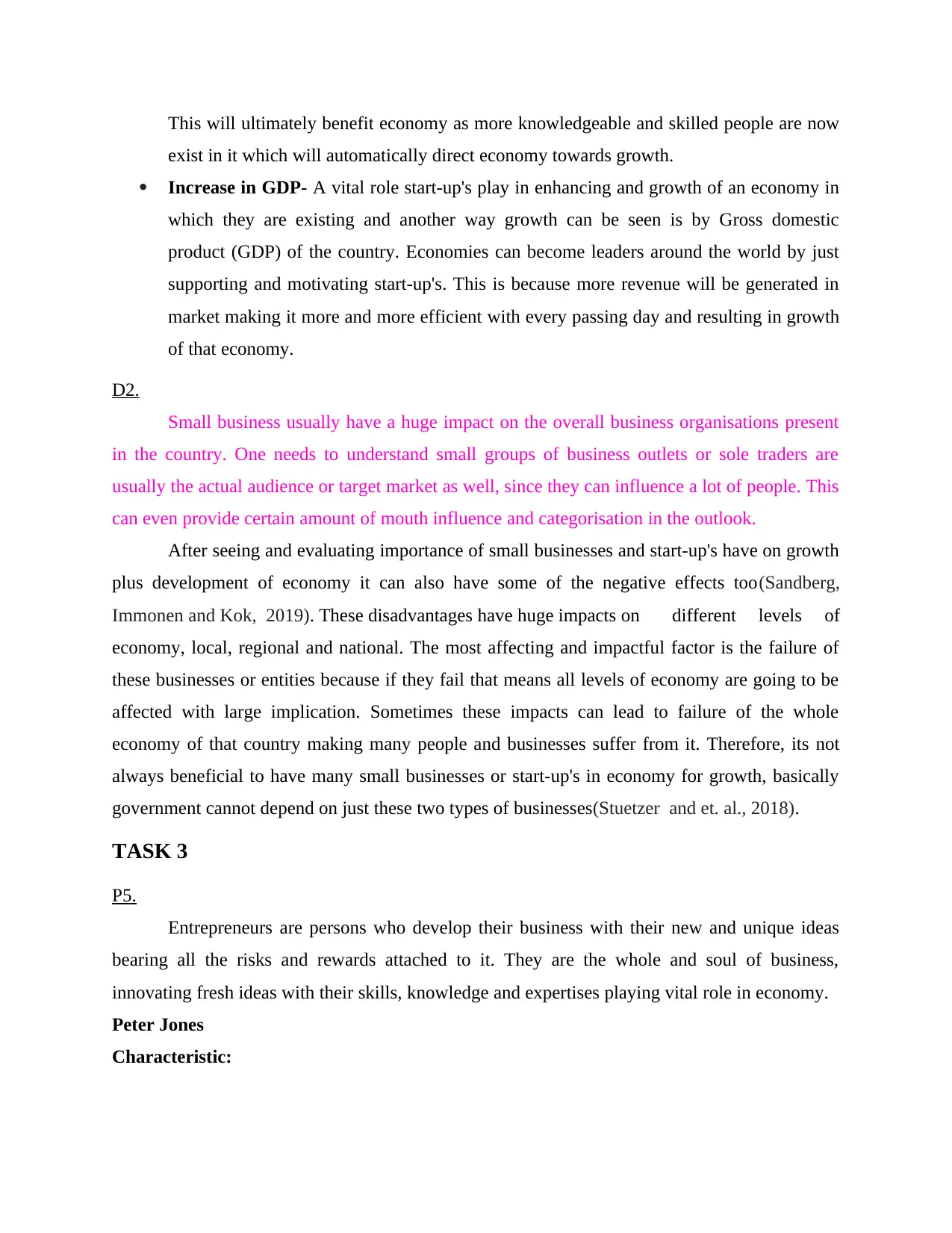
This will ultimately benefit economy as more knowledgeable and skilled people are now
exist in it which will automatically direct economy towards growth.
Increase in GDP- A vital role start-up's play in enhancing and growth of an economy in
which they are existing and another way growth can be seen is by Gross domestic
product (GDP) of the country. Economies can become leaders around the world by just
supporting and motivating start-up's. This is because more revenue will be generated in
market making it more and more efficient with every passing day and resulting in growth
of that economy.
D2.
Small business usually have a huge impact on the overall business organisations present
in the country. One needs to understand small groups of business outlets or sole traders are
usually the actual audience or target market as well, since they can influence a lot of people. This
can even provide certain amount of mouth influence and categorisation in the outlook.
After seeing and evaluating importance of small businesses and start-up's have on growth
plus development of economy it can also have some of the negative effects too(Sandberg,
Immonen and Kok, 2019). These disadvantages have huge impacts on different levels of
economy, local, regional and national. The most affecting and impactful factor is the failure of
these businesses or entities because if they fail that means all levels of economy are going to be
affected with large implication. Sometimes these impacts can lead to failure of the whole
economy of that country making many people and businesses suffer from it. Therefore, its not
always beneficial to have many small businesses or start-up's in economy for growth, basically
government cannot depend on just these two types of businesses(Stuetzer and et. al., 2018).
TASK 3
P5.
Entrepreneurs are persons who develop their business with their new and unique ideas
bearing all the risks and rewards attached to it. They are the whole and soul of business,
innovating fresh ideas with their skills, knowledge and expertises playing vital role in economy.
Peter Jones
Characteristic:
exist in it which will automatically direct economy towards growth.
Increase in GDP- A vital role start-up's play in enhancing and growth of an economy in
which they are existing and another way growth can be seen is by Gross domestic
product (GDP) of the country. Economies can become leaders around the world by just
supporting and motivating start-up's. This is because more revenue will be generated in
market making it more and more efficient with every passing day and resulting in growth
of that economy.
D2.
Small business usually have a huge impact on the overall business organisations present
in the country. One needs to understand small groups of business outlets or sole traders are
usually the actual audience or target market as well, since they can influence a lot of people. This
can even provide certain amount of mouth influence and categorisation in the outlook.
After seeing and evaluating importance of small businesses and start-up's have on growth
plus development of economy it can also have some of the negative effects too(Sandberg,
Immonen and Kok, 2019). These disadvantages have huge impacts on different levels of
economy, local, regional and national. The most affecting and impactful factor is the failure of
these businesses or entities because if they fail that means all levels of economy are going to be
affected with large implication. Sometimes these impacts can lead to failure of the whole
economy of that country making many people and businesses suffer from it. Therefore, its not
always beneficial to have many small businesses or start-up's in economy for growth, basically
government cannot depend on just these two types of businesses(Stuetzer and et. al., 2018).
TASK 3
P5.
Entrepreneurs are persons who develop their business with their new and unique ideas
bearing all the risks and rewards attached to it. They are the whole and soul of business,
innovating fresh ideas with their skills, knowledge and expertises playing vital role in economy.
Peter Jones
Characteristic:
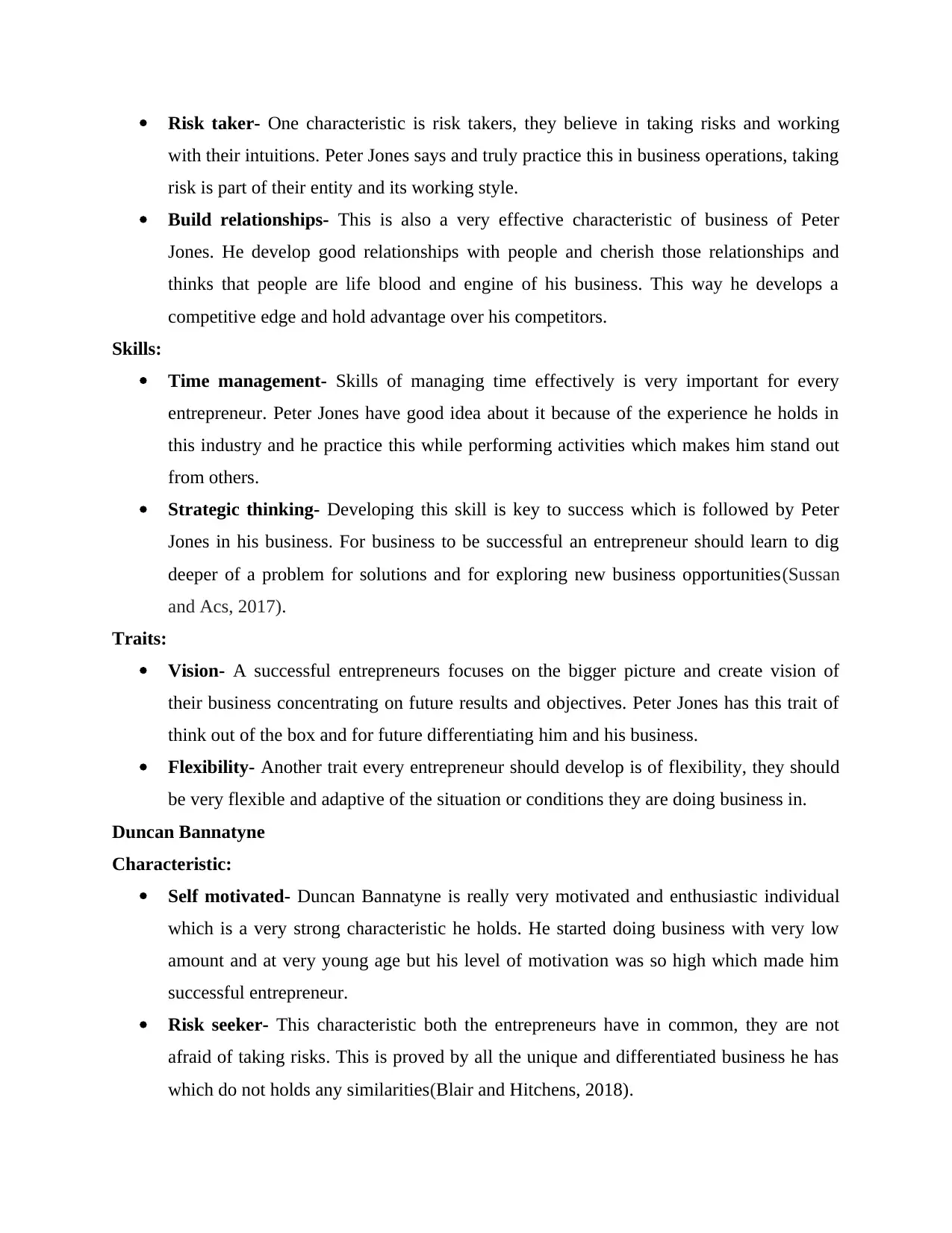
Risk taker- One characteristic is risk takers, they believe in taking risks and working
with their intuitions. Peter Jones says and truly practice this in business operations, taking
risk is part of their entity and its working style.
Build relationships- This is also a very effective characteristic of business of Peter
Jones. He develop good relationships with people and cherish those relationships and
thinks that people are life blood and engine of his business. This way he develops a
competitive edge and hold advantage over his competitors.
Skills:
Time management- Skills of managing time effectively is very important for every
entrepreneur. Peter Jones have good idea about it because of the experience he holds in
this industry and he practice this while performing activities which makes him stand out
from others.
Strategic thinking- Developing this skill is key to success which is followed by Peter
Jones in his business. For business to be successful an entrepreneur should learn to dig
deeper of a problem for solutions and for exploring new business opportunities(Sussan
and Acs, 2017).
Traits:
Vision- A successful entrepreneurs focuses on the bigger picture and create vision of
their business concentrating on future results and objectives. Peter Jones has this trait of
think out of the box and for future differentiating him and his business.
Flexibility- Another trait every entrepreneur should develop is of flexibility, they should
be very flexible and adaptive of the situation or conditions they are doing business in.
Duncan Bannatyne
Characteristic:
Self motivated- Duncan Bannatyne is really very motivated and enthusiastic individual
which is a very strong characteristic he holds. He started doing business with very low
amount and at very young age but his level of motivation was so high which made him
successful entrepreneur.
Risk seeker- This characteristic both the entrepreneurs have in common, they are not
afraid of taking risks. This is proved by all the unique and differentiated business he has
which do not holds any similarities(Blair and Hitchens, 2018).
with their intuitions. Peter Jones says and truly practice this in business operations, taking
risk is part of their entity and its working style.
Build relationships- This is also a very effective characteristic of business of Peter
Jones. He develop good relationships with people and cherish those relationships and
thinks that people are life blood and engine of his business. This way he develops a
competitive edge and hold advantage over his competitors.
Skills:
Time management- Skills of managing time effectively is very important for every
entrepreneur. Peter Jones have good idea about it because of the experience he holds in
this industry and he practice this while performing activities which makes him stand out
from others.
Strategic thinking- Developing this skill is key to success which is followed by Peter
Jones in his business. For business to be successful an entrepreneur should learn to dig
deeper of a problem for solutions and for exploring new business opportunities(Sussan
and Acs, 2017).
Traits:
Vision- A successful entrepreneurs focuses on the bigger picture and create vision of
their business concentrating on future results and objectives. Peter Jones has this trait of
think out of the box and for future differentiating him and his business.
Flexibility- Another trait every entrepreneur should develop is of flexibility, they should
be very flexible and adaptive of the situation or conditions they are doing business in.
Duncan Bannatyne
Characteristic:
Self motivated- Duncan Bannatyne is really very motivated and enthusiastic individual
which is a very strong characteristic he holds. He started doing business with very low
amount and at very young age but his level of motivation was so high which made him
successful entrepreneur.
Risk seeker- This characteristic both the entrepreneurs have in common, they are not
afraid of taking risks. This is proved by all the unique and differentiated business he has
which do not holds any similarities(Blair and Hitchens, 2018).
⊘ This is a preview!⊘
Do you want full access?
Subscribe today to unlock all pages.

Trusted by 1+ million students worldwide
1 out of 19
Related Documents
Your All-in-One AI-Powered Toolkit for Academic Success.
+13062052269
info@desklib.com
Available 24*7 on WhatsApp / Email
![[object Object]](/_next/static/media/star-bottom.7253800d.svg)
Unlock your academic potential
Copyright © 2020–2025 A2Z Services. All Rights Reserved. Developed and managed by ZUCOL.




